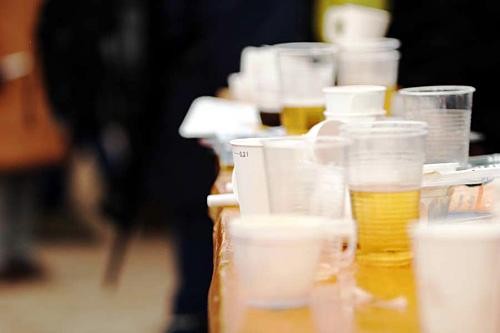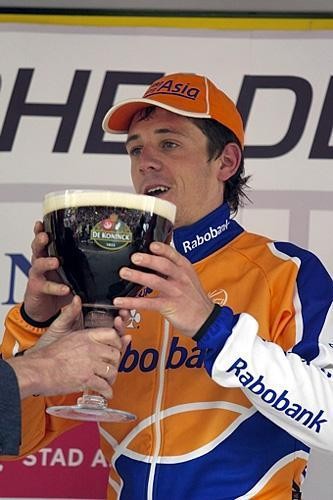Remembering Fred De Bruyne
His name was Fred De Bruyne and I am choosing my words with both care and amusement because there...


Tales from the peloton, May 12, 2007
He was the most convivial television commentator ever. And 30 years ago he packed in the job to become a still more convivial team manager. Les Woodland recounts the history of one of Belgium's finest Classics men.
His name was Fred De Bruyne and I am choosing my words with both care and amusement because there is, or at any rate once was, a code in these things. In the days before obituaries told the actual truth, a word like "flamboyant" meant a rampant, cruising homosexual. "Of firm convictions" meant bigoted. And "convivial" meant drunk. And Fred De Bruyne was convivial. He had seen the bottom of many bottles by staring down their neck.
I used to enjoy Fred when he was on Belgian television and I was new in the land. He used to sound sloshed at the start of a race, and I swear he sometimes had to be held upright by the end of it. When he was out of sight in a commentary box, it was bad enough for someone brought up on the politeness of the BBC; when they let him loose among the riders, it could be like seeing a drunk stumbling into church.
I forget which race it was, but it's in the archives sure enough because it gets pulled out now and then for "We remember Fred" features. It shows him wading into the peloton before a race and confronting Roger De Vlaeminck with a question of such mumbled complexity that De Vlaeminck has to ask him several times to repeat himself. And all Fred reveals is that he has been convivial, a fact that De Vlaeminck registers with politeness and a mocking smile.
For all that, Belgium loved him. Maybe because Belgium is a country where beer holds the status that wine enjoys elsewhere. Belgians remembered Fred as the winner of seven classics and the man who should surely have won the Tour de France. Whatever Fred said between 1961 and 1977 as he slurred his way through one race after another, the Belgian public listened to with fondness and respect.
For in little Fred - who was just 1m70 and barely taller than his top tube - they had a man for whom respect was appropriate. In 1947, when he was 16, he threw away his school books to concentrate on what he knew he did far better than thinking: he became a bike-rider. He won Milan-San Remo in 1956 , Liège-Bastogne-Liège in 1956, 1958 and 1959, the Tour of Flanders in 1957 and, in the same year, Paris-Roubaix and Paris- Tours. When you've done something like that, and you stay a man of the people, and your career ends only because you've broken bones and torn flesh on a bike and then in a car crash, folk forgive you if you soak up drink like a sponge.
The latest race content, interviews, features, reviews and expert buying guides, direct to your inbox!
"Look at his feet! Look at his feet!" was Fred's favourite expression. It was what he'd learned as a rider, that a man can put whatever expression of freshness he likes on his face but if he's dog-tired then the stiffness of his feet will give him away.
In 1977 he left Belgian television for reasons I never understood, or at any rate which were never wholly explained. He became manager, one of a succession, of the Flandria team. And then he left there and took on ever smaller teams, first Daf Trucks in 1979, then Aernoudt in 1983. By 1984 he didn't have a team of his own but worked as the PR man for Peter Post's Panasonic team, a job which left Post to get on with the riders and Fred to share a glass with his 'mates.
Maybe the consequences were predictable. De Bruyne didn't last as long as Post and off he went to the sunshine of Provence, where he wrote his life story and that of Rik van Looy, Rik van Steenbergen, Patrick Sercu and his recent boss, Peter Post. He lived in the same village as Raphaël Géminiani and by all accounts they had a wonderful and convivial time together. Géminiani is a man who, to this day, swears loudly that cycling isn't what it was, that riders aren't what they were, and that he's never going to a bike race again. And then the very next weekend, there he is once more at a café table somewhere, banging it with his hand and declaring to the world that cycling isn't what it was, that riders aren't what they were, and that he's never going to a bike race again. It was hardly any surprise that he and De Bruyne got on so well.
Géminiani said of his buddy: "Fred De Bruyne was a master of the classics; intelligent, crafty, devious but very strong and an excellent tactician. He wasn't a sprinter like van Looy or van Steenbergen but he had a good fast finish which meant he got in the results of the biggest classics.
"Elegant, extremely gentle, he left the world of cycling with ease. These days that doesn't mean much but then attitudes were different; once a Fleming, always a Fleming. We spent 10 happy years together."
It was in their joint village of Seillans that De Bruyne died on February 4, 1994. There may have been better riders and there were certainly better team managers. But when it came to a, er, fluid style of commentary, nobody did it better than Fred.
